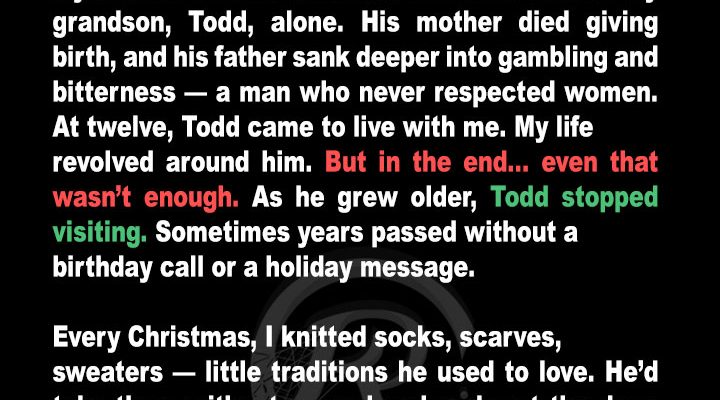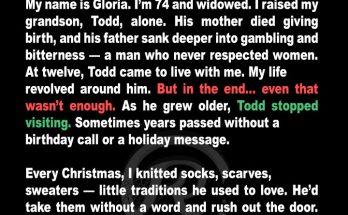I’m 74, living in a nursing home my own grandson dumped me in after tricking me into selling my house for his “girlfriend’s surgery.” When I suddenly inherited a fortune years later and he came crawling back for “his share,” I handed him $50 and a message written across the bills that forced him to choose: a year working as a low-paid caregiver here… or lose every penny forever.
My name is Gloria, I am 74 years old, widowed for more than 20 years, and I never thought I would be telling this story about my own grandson. I raised Todd from the time he was 12, after his mother died bringing him into the world and his father disappeared into casinos and cheap motels. I worked nights at a laundromat and cleaned offices on weekends so there would always be food, school clothes, and a warm bed waiting for him. “Todd’s my second chance at family,” I told my friend. “He’s my everything.”
Todd’s mother, my daughter Elaine, never got to hold him, never even opened her eyes after the doctors pulled him out. His father, Wayne, showed up to the funeral late, reeking of smoke and bad liquor, asking more about insurance money than about his own son. After that he drifted away like a stain in a cheap shirt, harder to see but never really gone. So when Todd’s behavior got wilder at twelve, when the school called about fights and stolen phones, the judge looked at me and asked, “Look, he needs help. Will you take him home and raise him properly?”
I said yes without even thinking. I moved Todd into my late husband’s house, the little brick place with the peeling white fence, and tried to give him the kind of steady life I had never really known myself. I cooked real dinners, checked his homework, sat up on the couch whenever he missed curfew. I went to every parent-teacher meeting, every game, even when he only rode the bench. I told myself that love had to count for something, that effort could patch the holes addiction and grief had left inside both of our lives.
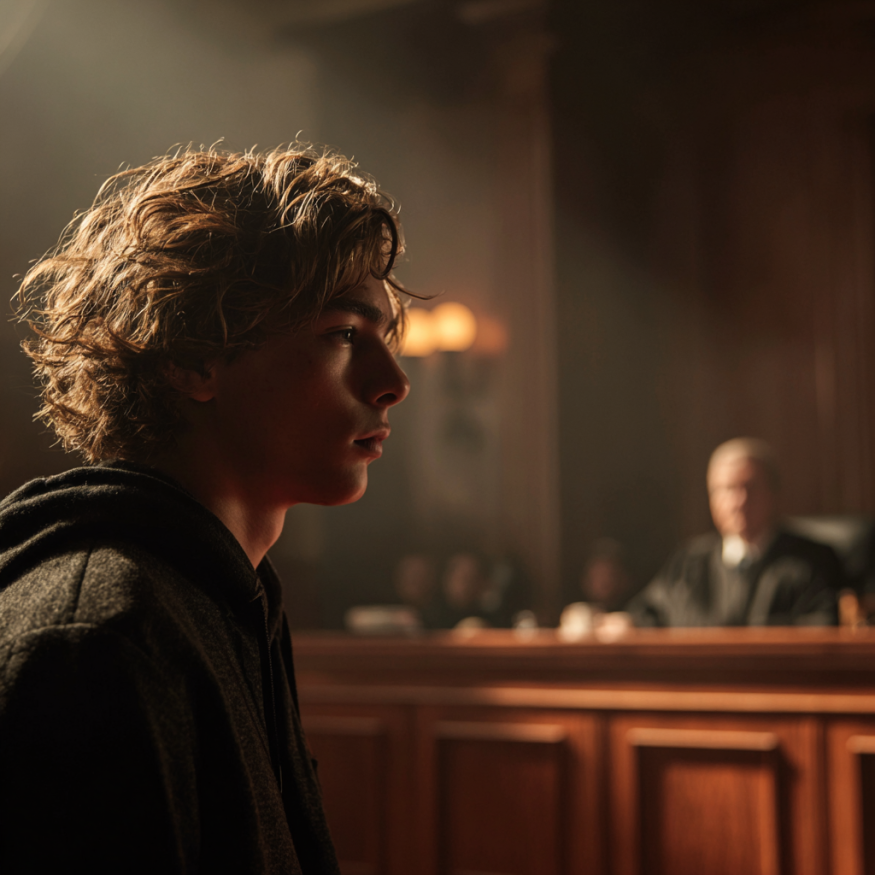
A teenage boy in court | Source: Midjourney
Somewhere between his 18th birthday and mine, Todd slipped out of my hands. He moved in with friends, then girlfriends, then people I never met. Text messages replaced real visits. He only showed up every few years for a quick drop in that always felt like a drive-through order. I would have tea ready, his favorite cookies, something simmering on the stove, and a little wrapped gift waiting. Socks I had knitted, a scarf, a sweater that matched his eyes. He would smile, drop a shallow “thanks,” pocket the present, kiss my cheek, and leave before I could ask about anything.
Every time the door closed behind him, the house felt too big. I would wash his cup slowly, fold the paper napkin he never used, and tell myself he was just busy, that young people lived differently now. “It’s because of the internet. Or maybe the city, or his friends,” I’d tell myself. Anything except the possibility that he simply didn’t care. I kept knitting, kept wrapping little things in leftover Christmas paper, kept a folder full of cards I never mailed. I spoke to his picture on the mantel more often than to the man himself sitting across from me in years now.
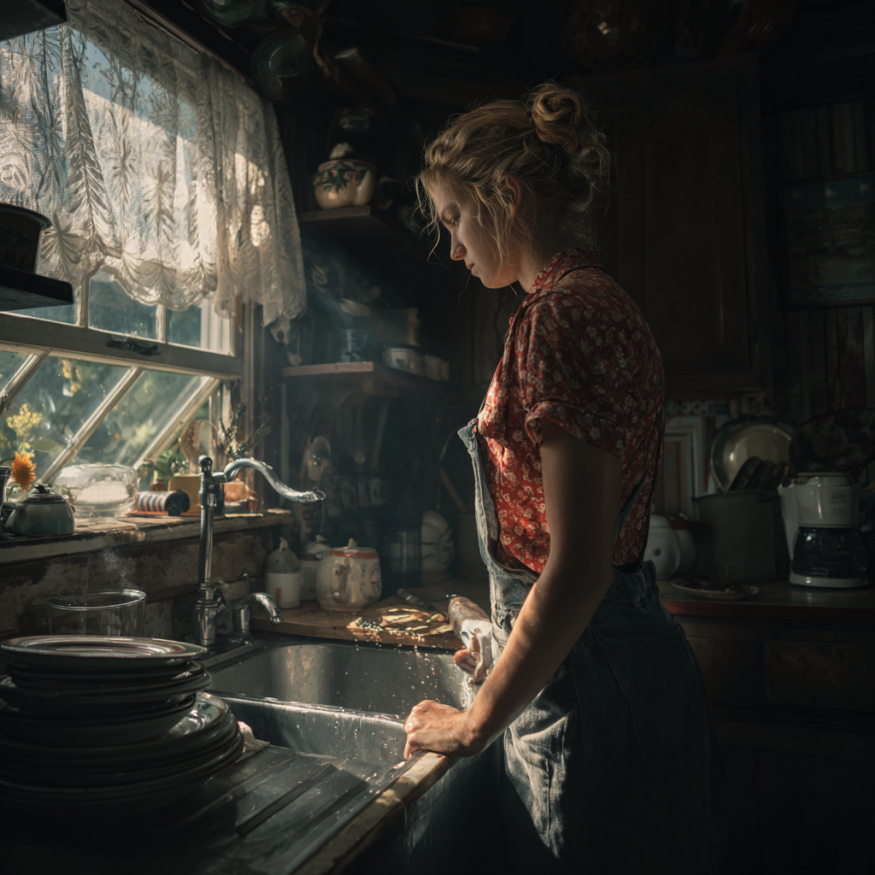
A woman standing in front of a kitchen sink | Source: Midjourney
Then, one gray afternoon, the bell rang and there he was on my porch, older around the eyes, thinner, twitchy in a way that made my stomach tighten. A woman waited in the car, sunglasses on, engine running. Todd came inside, sat at the edge of the sofa like it might bite him, and folded his hands. “Grandma,” he said, not quite meeting my eyes, “I need your help. Natasha needs an operation. I have run out of money. Could you maybe give me something so she can have the surgery?” His voice shook, but his eyes stayed dry then.
I had seen him lie before, little boy lies about homework and broken windows, but this was different. The word operation echoed in my head, tangled up with the memory of hospital lights over Elaine’s pale face. “Is she very sick?” I asked. “Have you talked with her parents?” Todd swallowed, shook his head, and piled on details that sounded thin and hurried. I wanted to believe him so badly I let go of common sense. My savings were modest, but the house was worth real money. I signed the papers and sold it for what he called necessity.

A for sale sign in front of a house | Source: Midjourney
Part of the bargain, unspoken but obvious to me, was that I would move in with Todd and Natasha. It made sense on paper. I would not be alone, they would not have to pay rent, and we could finally be a family under one roof again. I packed my life into boxes, donated furniture, and kissed the walls goodbye. When Todd pulled up in a used sedan and loaded my suitcases, I felt a flicker of hope. Maybe this was our fresh start, a late miracle squeezed out of all the hurt that came before and still haunted our steps.
The apartment they shared was small and cluttered, smelling faintly of cheap cologne and old takeout, but I told myself it was cozy. I cleaned the kitchen until the counters shone, opened the windows to let real air in, and stocked the fridge with actual vegetables. Natasha watched me like a cat watches a stranger, polite smile, cold eyes. Todd called me “a lifesaver” when dinner appeared at six and his laundry came out folded. I made myself useful, because usefulness had always been how I justified my place in the world from childhood right into my old age too.
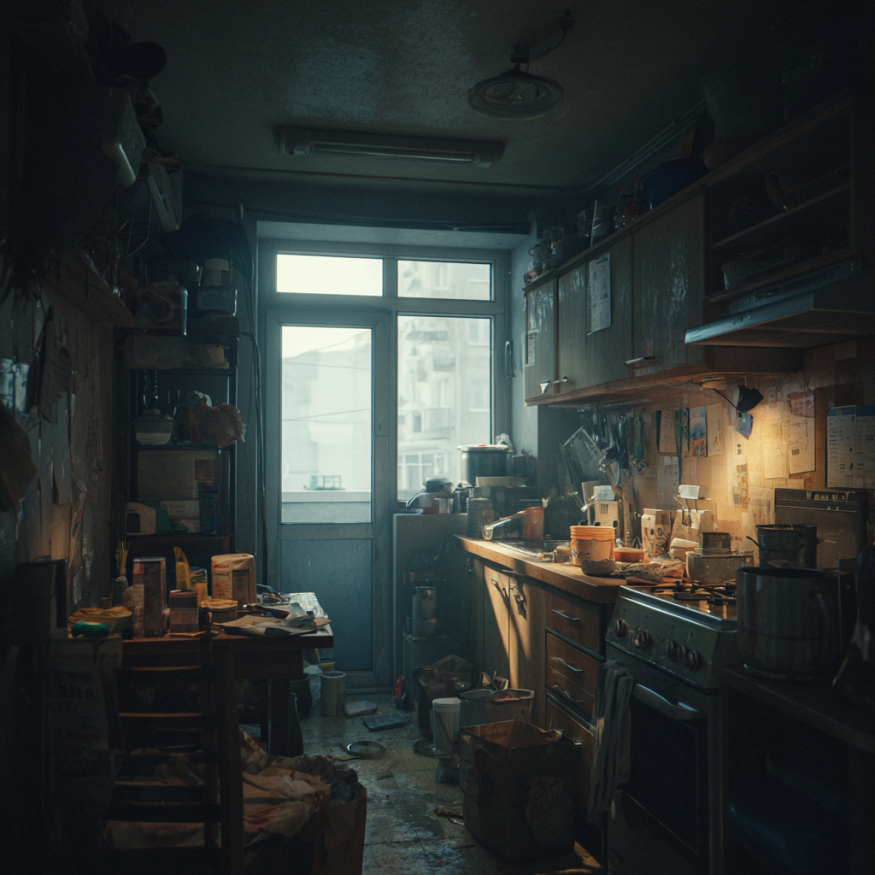
A cluttered apartment interior | Source: Midjourney
It took about three weeks for the cracks to show. No one ever mentioned a hospital. There were no appointment reminders, no prescriptions, no paperwork on the table. Instead, there were new clothes on Natasha, a newer television, glossy brochures for resorts under the junk mail. When I asked how Natasha was feeling, she pressed a hand to her stomach and sighed theatrically, then changed the subject. One afternoon I was watering the sad little plants on the balcony when I heard her voice drift through the open sliding door, sharp enough to cut right through the softest parts inside.
“I cannot wait to be rid of her,” Natasha hissed. “She is such a burden. She doesn’t work; she just sits there reading those sad little books and judging us.” I froze, my hand still on the watering can. The soil kept drinking while my heart stopped. Todd’s voice came next, lower, familiar in a way that hurt. “Relax,” he said. “Once she is out of the way, we can finally enjoy ourselves. Hawaii, remember? First trip, no interference. We didn’t drag her here just to babysit us forever.” They both laughed, and the sound hollowed me out.

A brand new TV | Source: Midjourney
I stood there on that balcony, with 50 years of memories of being abandoned, and felt something inside me crack like thin glass. They had never needed surgery money. They had needed a down payment on their freedom from me. I packed the watering can away, wiped my eyes, and pretended not to know. A week later, Todd announced we were taking a drive to “check out a nice place.” I knew before we pulled into the parking lot with the tasteful sign. A nursing home. My new address, whether I liked it or not.
They gave me a brochure and a tour, but all I saw was the door closing behind us. Todd carried my single suitcase like a favor; Natasha checked her phone in the hallway. In the room they had assigned me, he kissed my forehead. “Do not worry, Grandma,” he said. “I will visit every week. You will love it here. They have activities.” As if I were a bored child at summer camp. Weeks became months, and months became years. His visits shrank to holidays, then to nothing at all.
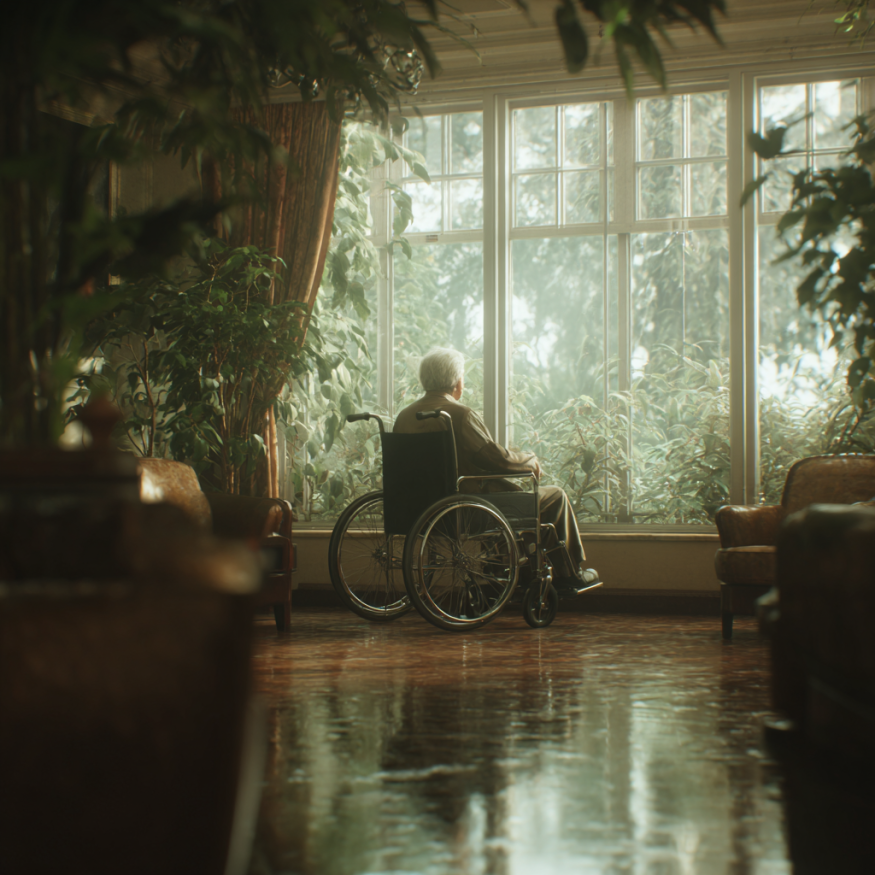
An older woman sitting in a nursing home | Source: Midjourney
I will not pretend the nursing home was a nightmare. It was clean, the food was salty but warm, and there were kind people there who treated me like more than forgotten luggage. Sophie, my favorite aide, always took an extra minute to fix my hair or ask about my day. I learned the names of the other residents, their stories, their losses. Life shrank to four walls and a view of a gray courtyard, but it was still life. Then, one morning, the director stepped into my room with a letter clutched carefully between her fingers like fragile news.
“Good news, Gloria,” she said, handing it over. My hands shook as I opened the envelope, half expecting bad lab results out of old habit. Instead, I read that my cousin Donovan, the last wild branch of our family tree, had passed and left me a sizable inheritance. He had owned land, investments, things I barely understood. Suddenly there was money again, more than I had ever seen written in my name. I sat on the bed, letter in my lap, and knew, as surely as I knew my own name, that Todd would come, drawn like metal to magnets.

An envelope on a coffee table | Source: Midjourney
I didn’t even have to phone him. News like that travels faster than any phone line when you have relatives who talk. Within two weeks, Todd appeared in the lobby, accompanied by the same nervous energy and an expensive jacket. Natasha did not come; I suspected she was busy spending what they already had. He hugged me awkwardly, sat on the visitor chair, and launched into his script. “Grandma, I heard about Donovan. I am so happy for you. Listen, I would not ask, but Natasha needs another operation. Could I get my share early this time?”
I watched his face while he spoke. There was no shame there, no actual fear for this woman he claimed to love, only calculation. Once, that would have gutted me. Now it just settled over old scars. “Todd,” I said, “I can help you, but not today. The lawyers are still sorting things out. Come back next week. I will meet with them, and we can handle everything in cash so it’s easier.” His eyes lit up like a Christmas morning. He thanked me, called me an angel, and hurried away, already spending money I had not handed over yet.

A young man in an expensive jacket | Source: Midjourney
After he left, I asked Sophie to wheel me down to the small conference room where the legal aid volunteers met with residents. I told the young attorney everything, from the false surgery to the house I had sold. Saying it out loud hurt more than I expected, but it also cleared the fog from my mind. We rewrote my will. The bulk of Donovan’s gift would go to the nursing home if Todd refused my condition. If he accepted, he would receive his share only after completing one full year of work there, on the staff, caring for residents.
In the end, I still could not bring myself to slam the door on him completely. Some stubborn old part of me held on to the hope that he might grow, the way plants reach for any scrap of light. So when the lawyer finished, I asked for 50 dollars in small bills. Back in my room, I sat at the little desk and, with my shaking hand, wrote a sentence across each bill. Together they formed a message, the last lesson I knew how to give my grandson who had forgotten me long before I faded.

A stack of money | Source: Midjourney
A week later he came back, just like he had promised, which might have been progress if he had not been led by greed. He walked into the lounge smelling of aftershave and hope, rubbed his hands together, and asked if everything was ready. I could see the other residents watching us over their card games and magazines, curious, maybe a little protective. I handed him the envelope with the fifty dollars inside. “Here,” I said. His fingers tore it open before the word even finished leaving my mouth, hungry eyes searching for stacks that were not there at all.
“Fifty dollars?” he snapped, voice too loud for the quiet room. “Where is the rest, Grandma? Stop playing games. I know how much Donovan left you.” His face flushed a dark, ugly red. For a moment I thought he might crumple the money and throw it at my feet. Then his eyes narrowed. He noticed the ink on the bills. “What is this?” he muttered, smoothing one out. The writing was large enough that he had to read it aloud. Word by word, bill by bill, the message came out of his mouth like something bitter he could not spit.

An envelope with money | Source: Midjourney
“Todd,” he read, “you know I love you, but you have forgotten how to care for anyone but yourself. Money will not buy you love, respect, or peace. If you want the inheritance, there is only one way. You must work here, in this home, for one full year. You must feed the people, clean their rooms, listen to their stories, and learn to see them as human, not burdens. When the year is over, if the staff agrees you tried, the lawyers will release everything that was meant to be yours. If you refuse, they inherit it all instead.”
For a heartbeat, the whole room held its breath. Todd stared at me, fists clenched around the money, knuckles white. “You cannot be serious,” he said finally. “You expect me to play nurse for a bunch of strangers just to get what is mine? This is twisted, Grandma.” I met his eyes and saw the little boy he had been, the man he had chosen to become, and the thin bridge I was offering between them. “It is your choice,” I said. “Walk away, and the home keeps it. Stay, and you might earn more than money. Think, then answer.”
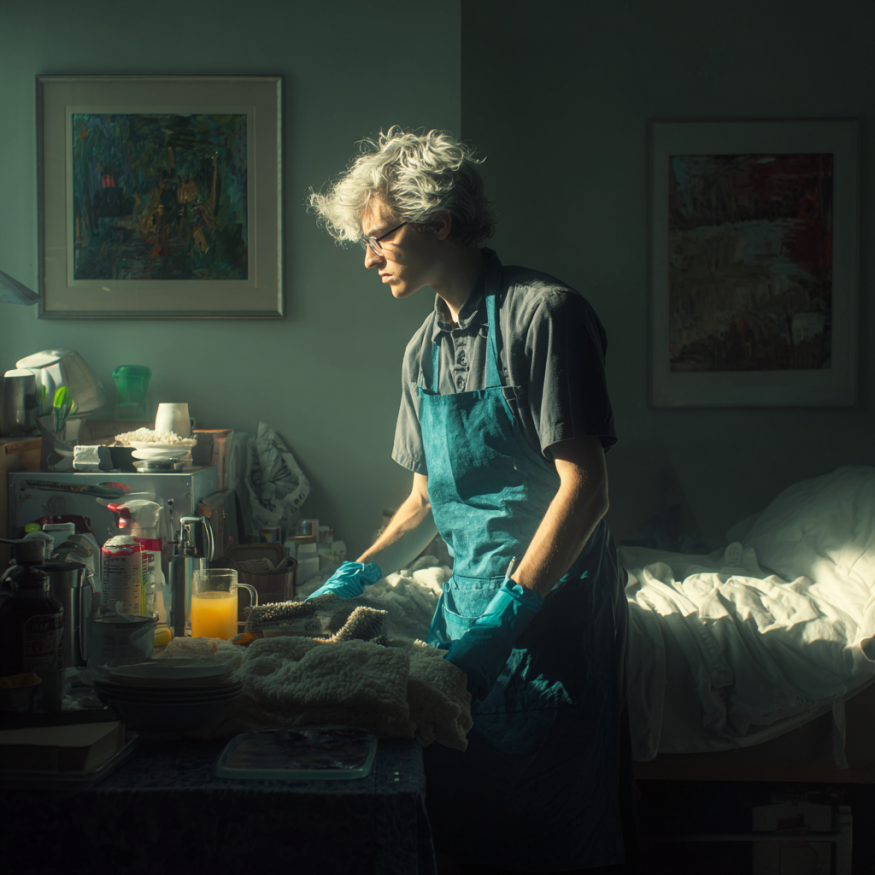
A young man working in a nursing home | Source: Midjourney
He left that day in a storm of angry footsteps and muttering. I honestly thought I had lost him for good. But greed is a strange teacher, and maybe some small buried conscience answered too. Two days later he came back, eyes bloodshot, jaw tight. “Fine,” he said. “I will do it. One year. Then I’m done.” The administrator hired him as an aide in training. I watched from my doorway as he learned to change sheets, push wheelchairs, and spoon soup into trembling mouths. At first, he moved like he was serving a sentence, not building himself up.
Days became weeks, and something quiet shifted. I caught him laughing with Mr. Alvarez over a card trick, staying late to sit with Mrs. Greene when her pain was bad, fixing Sophie’s broken watch on his own time. He started visiting me without an agenda, bringing coffee, asking about my memories, really listening. By the time the year ended, the man who sat beside my bed was not the one who had dumped me here. When the lawyer arrived with the final papers, Todd looked at me and said, “I want to do this right, Grandma.” For once, I believed.
